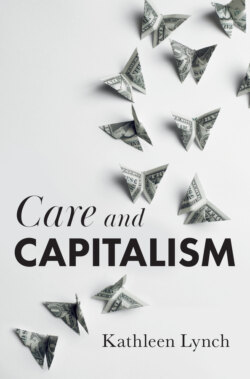Читать книгу Care and Capitalism - Kathleen Lynch - Страница 23
Domination and carelessness: pre-capitalist antecedents
ОглавлениеThere is nothing new about the human desire to exercise dominion and power over others and over the environment; such dispositions and practices have a long history across cultures and time wherever untrammelled power reigns. In gender terms, the enslavement of women, be it as a form of family currency in marriage arrangements or as a peace offering in times of war, showed scant regard for their care; and it preceded the formation of classed systems of oppression by a few thousand years (Lerner 1986: 212–19). In racial terms, hierarchical binaries between human, thinking beings and non-human, extended things (Patel and Moore 2018: 44–63) led to ‘natives’ being defined as ‘a sort of quintessential evil’ that had to be eradicated (Fanon 1967: 32). Defined as less than human by their skin colour (Tsri 2016), many African people became ‘things’ to be exploited for profit by powerful men and women for their own ends, while those who were defined as ‘Oriental’, or Eastern, were presumed to be culturally inferior to Western peoples (Said 1978).
Though disregard for the needs and sufferings of others is not the preserve of capitalism, it is strongly associated with it as a political-economic system, not least because the making of profit at the expense of others and of nature requires a cheapening and abusing of life in all its forms, especially given the finiteness of humans’ and nature’s resources (Patel and Moore 2018). When all that counts is what is countable in monetary terms, human relations become care-less.
The everyday activities of properly functioning capitalism do not produce forms of concern that lead to a sense of responsibility to others. People are constructed as interchangeable within capitalist logic and, as such, individually dispensable; fashioned as units of human capital, they are instrumentalized, habitually formed and re-formed in the service of the market and thereby distanced from others (Ferrarese 2017a). There is a coldness towards the needy other that is endemic to the logic of capitalism (MacDonald 2011).
While undermining care ethics is not unique to capitalism, it does take distinct forms under neoliberal capitalism: as the latter is globalized, and increasingly unregulated, it can be more predatory in character, exploiting and exacerbating crises in pursuit of profit in ways that are deeply harmful (Jessop 2019). Even in theory, profit-making is no longer regulated by the self-discipline and responsible stewardship that Weber (1930) regarded as the hallmarks of capitalism in the nineteenth and early twentieth century. Rather, the rational pursuit of self-interest is regarded as having a high moral purpose (Rand and Branden 1964).
